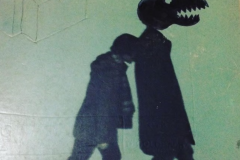To say today’s music industry is oversaturated is an understatement. More than ever, musicians and labels alike need to find ways to differentiate themselves, tapping into the farthest-reaching frequencies of their creative bandwidths. If you’re even a casual appreciator of music, especially one of the independent variety, this likely isn’t news to you. However, what you might not know is that beyond the blood, sweat, and tears, there are still a lot of folks out there who genuinely love what they do. They thrive where most waver and are usually those that force others, including those in the so-called “majors,” to rethink how they’re getting their music into the hands of their fans.
A strong case for this is the newly founded Los Angeles-based record label Blank City Records. Cofounded by Marc Sallis, Brandon Burkart, and Kawika Campbell, the label houses bands from a variety of genres, including Sallis’ own psych/desert rock band, The Saint James Society. The label functions much like most successful labels often do, but with a notable exception: they print their records on X-rays.
Also known as a “rib,” this method of music sharing was developed by Russia’s underground music movement in the 1950s and ’60s, and distributed via the black-market, as a way to bypass the government’s strict censorship laws. Ribs can only host a short length of songs and are usually only good for a handful of listens. Quickly, the materials will warp, and the music will be lost. While this could seem like a design limitation to some, particularly those who blindly follow the rapidly trending era of digital distribution, ribs offer an elegant alternative to fans that prefer to purchase boutique albums they can have and hold.
Sallis, Burkart and Campbell tap into this love of physical album production, but also aren’t ignoring the fact that fans do most of their listening digitally. Balancing both the physical distribution with easily accessible streaming and download options, combined with a highly tasteful selection of artists, the three have a recipe for success. Case in point, Covered in Blood, the newest release from the Saint James Society, a five-track EP of cover songs, sold out in less than 24-hours during its pre-sale. Don’t sweat if you missed ordering an X-ray; you can still stream their EP on Spotify.
Ghettoblaster’s Andrew Humphrey recently caught up with Sallis to discuss the newly founded label.
Ribs were developed as the direct result of Russian censorship, in order for fans to smuggle in new and interesting music. Do you see any parallels with this and the contemporary music climate?
It was their way, as a community of music lovers, for sharing music. They didn’t have record players and they couldn’t press vinyl in the traditional sense. There were no pressing plants… there were original recordings by Russian artists, you know like jazz bands, pop bands… and this was the way they were sharing their music. It wasn’t just like they were listening to The Beatles and The Stones. They were listening to their own countrymen, who were making their own music. It was that side of it that intrigued us… that there was this new way of sharing music for themselves.
There are two sides of it. The first one being that these things play maybe once, maybe ten times, but the sound, eventually, will depreciate… I love that it has a lifespan. It’s like a snapshot, but you’re left with a physical product. The flipside of that is the recycling element of it as well. We love that we have this really intimate part of someone’s medical history that we’re giving a new leaf of life into and are turning into a piece of art.
How about your selection of musicians? You have some rock and roll, some hip hop…quite the eclectic roster of artists. What do you look for in the artists you sign?
As a label, we don’t want to be genre-specific. I think if you’ve got the right bands, you can all play on the same bill… we really care about good people and good music. Those are the two things we need for us to put something out. You have to be a good person, and you have to have the music to back it up. If we got a chance to sign a band or an artist that would be the next “big thing,” but they were assholes, then we wouldn’t do it. Everything just has to be authentic these days.
You have a really boutique offering, but are also savvy with digital distribution. Is that where you think things are trending in the music industry?
When we initially started the label we thought, “wouldn’t it be great if we had a song that people could only hear on the X-ray, nowhere else in the world.” I’m sure we will do that at some point, with the right band and for the right reason… if we could make a lot of money out of that for a good purpose, like for some charity with a big artist. But that’s not going to do any favors for the bands we’re working with [currently]. I don’t want to put them at a disadvantage by saying “your songs are only going to be on 100 X-rays”… that’s just cutting your nose off to spite your face, ignoring the fact that people are listening to their music on Spotify or Apple Music…We didn’t want to do that to our bands, but we wanted to give our fans and potential fans… some kind of value for their money. So, if they can’t get one [of the X-rays], they could at least go buy it on iTunes or start streaming it when it comes out on Spotify.
On the flipside of that, obviously, is that we love that vinyl has made a comeback. They’re buying it because people miss having a physical product… they’re probably still listening to the track on Spotify, but they still want something physical. They’re craving it.
(To shop for the newest releases by Blank City Records, including those from Sallis’ band, the Saint James Society, visit them online.








Social Media